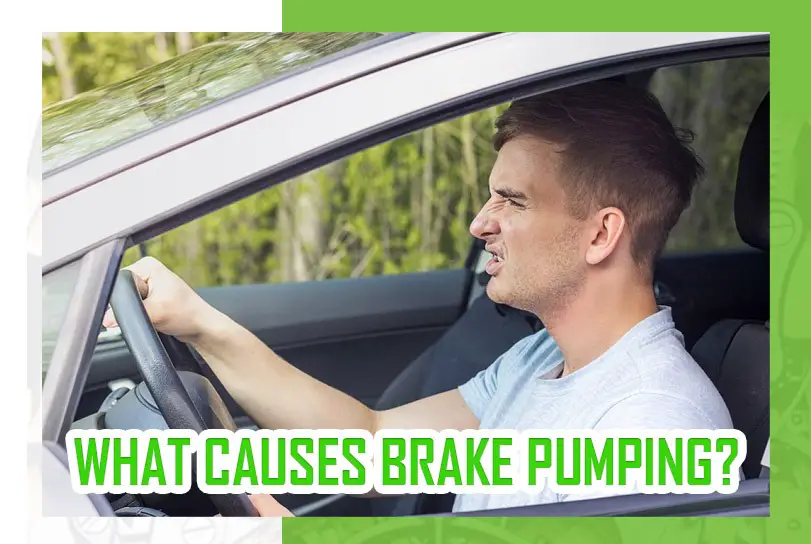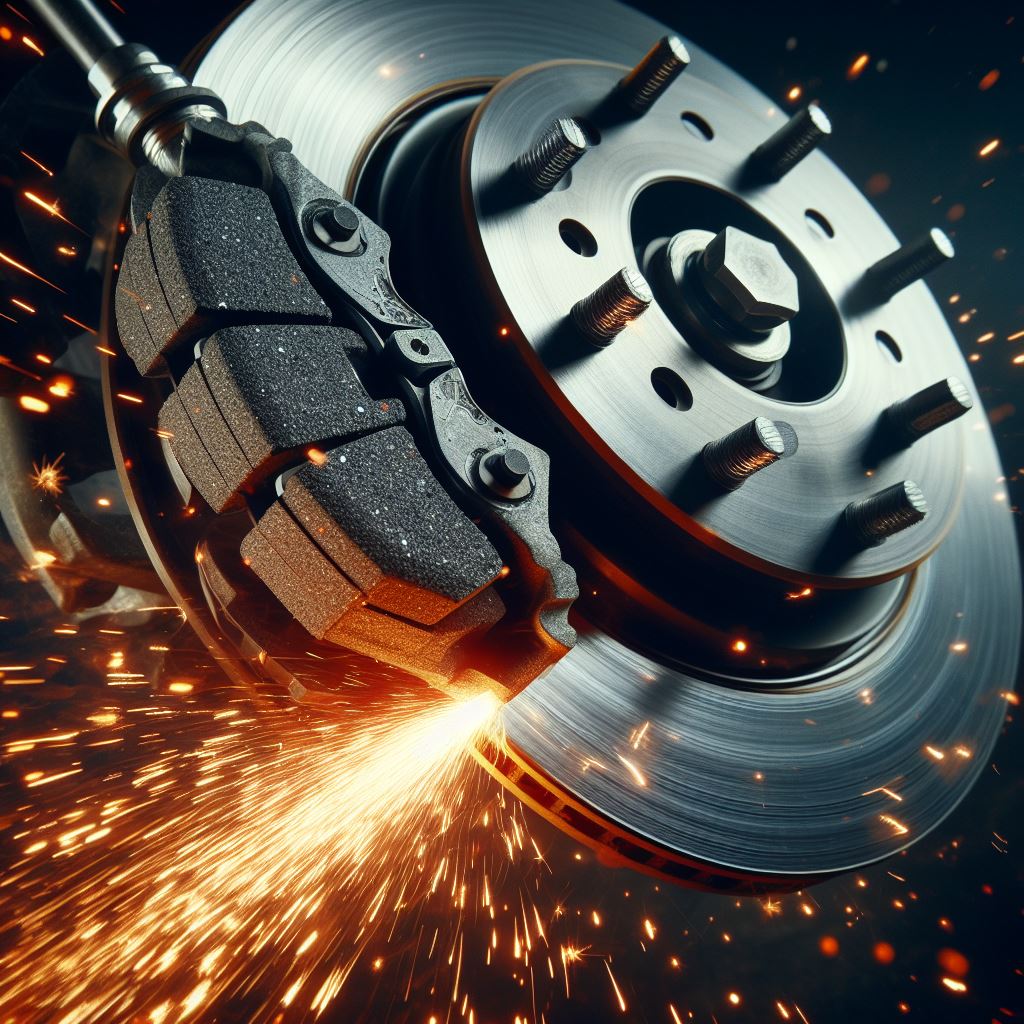Why Are My Brakes Pumping When I Stop? Here’s the Answer
You’re driving along and suddenly you have to brake hard. You press down on the pedal and…nothing happens. You pump the brakes and finally the car slows down. What’s going on? Is there something wrong with your brakes?
The good news is that if your brakes are pumping when you stop, it’s probably not a sign of a serious problem. In most cases, it’s simply a matter of air in the brake lines. When there’s air in the lines, it prevents the brake fluid from flowing properly. As a result, you have to pump the brakes to build up enough pressure to stop the car.
What Causes Brake Pumping?

Brake pumping is a phenomenon that can occur in hydraulic braking systems. It is caused by the trapped fluid in the system being forced out of the brake calipers and hoses under pressure, which in turn causes the brakes to pulse. This can be very dangerous, as it can lead to a loss of braking power.
There are a number of factors that can contribute to brake pumping. One of the most common causes is when the brake pads wear down and begin to expose the metal backing on the rotor. This will cause the calipers to clamp down harder on the rotor, which will create more pressure and lead to brake pumping.
Another common cause is when air becomes trapped in the system. This can happen when there is a leak in the system, or when the fluid level drops too low. When air enters the system, it will compress and create resistance, which will lead to brake pulsing.
There are a few things that you can do to help prevent brake pumping. One is to make sure that your brake pads are properly aligned and that there is no contact between the pad and rotor.
You should also make sure that your fluid level is high enough, and that there are no leaks in the system. If you do experience brake pumping, try to release some of the pressure by gently depressing the brake pedal. If this does not work, you may need to take your car to a mechanic for repair.
Is it a Safety Issue?
Brakes are one of the most important safety features on a car. They allow you to stop in time to avoid a collision. When the brake pedal is depressed, the brake fluid travels from the brake reservoir to the brake calipers, which apply pressure to the brake pads. The brake pads press against the rotors, causing them to slow down or stop.
Most modern cars have a built-in system that prevents the brakes from overheating. However, if you pump the brakes on an older car, you could damage this system and cause the brakes to fail.
It’s important to know how to use your brakes correctly. Pumping the brakes can cause them to wear out prematurely and may not even be necessary in most cases. If you’re not sure how to use your brakes, consult your owner’s manual or ask a mechanic for advice.
What are the Symptoms of Brake Pumping?
Brake pumping is when you push the brake pedal down and release it quickly several times in succession. The symptoms of brake pumping are a spongy brake pedal, brake drag, and reduced brake performance.
Brake pumping is most likely to occur when your brake fluid is low or dirty, or if there is air in your brake line. If you suspect that you are brake pumping, the best thing to do is to take your car to a mechanic and have them check your brakes.
What Should You Do if Your Brakes Start to Pump?
Your brakes are a critical safety system in your car, so it’s important to know what to do if they start to pump.
If your brakes start to pump, the first thing you should do is pull over and stop your car. Do not continue driving if your brakes are pumping, as this could lead to a serious accident.
Once you’ve stopped your car, take a look at the brake fluid level. If the fluid level is low, you may need to add more fluid. If the fluid level is high, there may be a problem with your brake system, and you should take your car to a mechanic.
If the brake fluid level is normal, try pumping the brake pedal a few times. If the brakes start to pump again, there may be a problem with the brake system, and you should take your car to a mechanic.
If the brakes don’t start pumping again after you’ve pumped the pedal a few times, there may not be a problem with the brake system, and you can continue driving. However, it’s still a good idea to have your brakes checked by a mechanic as soon as possible.
How Can You Prevent Brake Pumping?
There are a few things you can do to prevent brake pumping.
One is to make sure your brakes are properly adjusted. You should also bleed your brakes regularly to get rid of any air bubbles.
Finally, make sure your brake fluid level is correct and that your brake pads are in good condition.
How to Bleed Your Brakes

The best way to get rid of air in the brake lines is to bleed the brakes. This is a relatively simple process that anyone can do with just a few tools. You’ll need a wrench, a socket set, and a turkey baster or syringe.
Start by loosening the bleeder screws on each wheel until you see fluid coming out. Then, have someone press down on the brake pedal while you hold the screws open.
Once fluid starts coming out without any bubbles, tighten the screws and move on to the next wheel. Repeat this process until all four wheels have been bled.
Once you’ve bled the brakes, they should work properly again. If they’re still pumping, there may be a leak in one of the lines or a problem with the master cylinder. In either case, it’s best to take your car to a mechanic so they can diagnose and fix the problem.
How to repair my brakes by myself?
If you need to repair your brakes by yourself, it is important to first assess the issue to determine what type of repair is needed. You may need to replace the brake pads, rotors, or even the brake fluid. If the repair is more complex, you may need to enlist the help of a mechanic. Before attempting any repairs, make sure you have the correct tools and safety equipment, as well as the correct replacement parts.
Additionally, make sure you have a good understanding of the repair process before beginning.
How much will It Cost to Have My Brakes Fixed?
There’s no need to worry if you’re experiencing braking problems; having your brakes fixed is a relatively affordable and straightforward process. The cost of brake repair will vary depending on the make and model of your car, as well as the specific work that needs to be done, but most services will fall within the $100-$300 range.
If you’re not sure what’s causing your braking issues, it’s best to take your car in for a diagnostic check. This will help identify the root of the problem and ensure that the necessary repairs are made.
Brake repair can be a big expense if left untreated, so it’s important to address any problems as soon as they arise.
When it comes time for brake repair, be sure to choose a qualified and reliable mechanic. Ask around for recommendations or check with the Better Business Bureau to find a reputable business. Taking care of your car’s brakes is essential for safe driving; don’t wait until there’s a major issue to get them fixed.
Why Are My Brakes Pumping When I Stop? Video
Frequently Asked Questions (FAQs)
Q1: What causes brake pumping in hydraulic braking systems?
A1: Brake pumping occurs when trapped fluid is forced out under pressure, often due to factors such as worn brake pads exposing metal backing or air entering the system.
Q2: Is brake pumping a safety issue?
A2: Yes, brake pumping can lead to a dangerous loss of braking power. It’s crucial to understand proper brake usage to avoid premature wear and potential brake system failure.
Q3: What are the symptoms of brake pumping?
A3: Symptoms include a spongy brake pedal, brake drag, and reduced brake performance. These signs indicate issues such as low or dirty brake fluid or the presence of air in the brake line.
Q4: What should you do if your brakes start to pump?
A4: Pull over and stop immediately. Check the brake fluid level and pump the brake pedal a few times. If the issue persists, consult a mechanic to inspect and address potential brake system problems.
Q5: How can you prevent brake pumping?
A5: Ensure proper brake pad alignment, maintain correct fluid levels, and promptly address any leaks. Regularly bleed the brakes to eliminate air bubbles and prevent issues related to uneven pressure distribution in the braking system.
Wrap Up!
If your brakes are pumping when you stop, don’t panic! In most cases, it’s simply a matter of air in the brake lines. Bleeding your brakes is a relatively simple process that anyone can do with just a few tools.
Once you’ve bled your brakes, they should work properly again. If they’re still pumping, there may be a leak in one of the lines or a problem with the master cylinder—both of which require professional help to fix.
